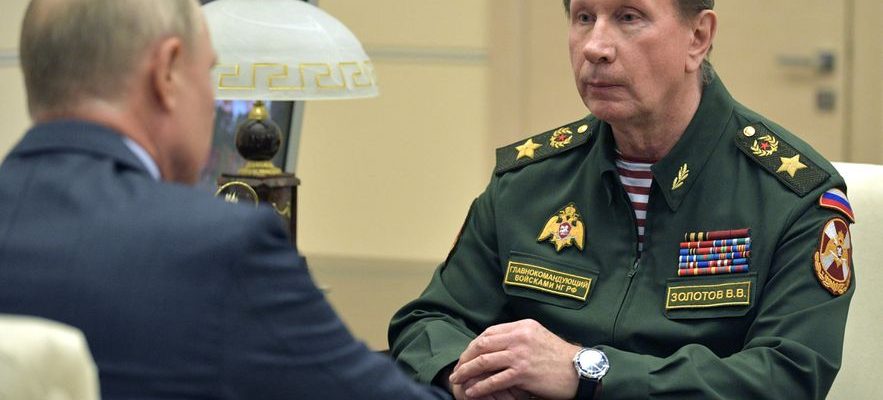“The faithful among the faithful”. This is how Françoise Thom, a historian specializing in the USSR and post-Soviet Russia, tends to describe the Russian National Guard. While the future of the Wagner group in Ukraine is now unclear after its failed mutiny attempt in Russia at the end of June, it is this military unit, the Rosgvardia, which seems to have gained in exchange. Vladimir Putin has indeed promulgated a law on August 4 strengthening the armament of his National Guard. It will thus be granted heavy weapons such as tanks, artillery or combat helicopters, as well as part of the responsibility for the fight against drones, which is becoming an increasingly urgent concern for Moscow.
However, all this new equipment does not really correspond to the original prerogatives of this military unit. Created in 2016 by Vladimir Putin, its mission is above all to ensure the maintenance of order and the internal security of the country. “The National Guard is a kind of praetorian guard, directly subject to Vladimir Putin. It is one of the ideological and military pillars of the Russian army”, explains Adrien Nonjon, doctoral student at the National Institute of Oriental Languages and Civilizations. (Inalco), specialist in the post-Soviet space and Ukraine. “We can see it as Putin’s personal army”, abounds in this sense Françoise Thom. The Russian National Guard claims more than 350,000 troops; according to the British Ministry of Defence, nearly 200,000 would be operational on the front.
But it is precisely the security of Russian soil that was called into question by the rebellion of the Wagner group at the end of June. The speed at which Yevgeny Prigojine’s troops advanced on Russian territory worried the very top of the Russian state. “Russia could think of itself spared from the fights and the coups beyond its border with Ukraine. Seeing that overnight Prigojine could move so quickly and arrive in the capital was very fear in the regime”, details Adrien Nonjon. A finding confirmed by a note from the British Ministry of Defense, which sees in this decision a sign that “the Kremlin is redoubling its efforts to make the Russian National Guard one of the key organizations to ensure the security of the regime”.
A leading role in Ukraine
Nevertheless, the influence of the National Guard does not stop at Russian borders. Forces from this unit were associated with the invasion of Ukraine from its start on February 24, 2022. An article from the british newspaper The Telegraph revealed that two days before the start of the war, forces of this unit were already present at the border, ready to enter Ukrainian soil.
In Ukraine, the Rosgvardia is notably responsible for maintaining order in the occupied territories. “A mission that requires a certain experience and a great devotion to power, because sometimes involving having to do terrible things”, insists Adrien Nonjon. “This unit is now acting as an army of occupation. More than ever, the role of this National Guard will be to clean up the occupied territories in Ukraine and to eradicate Ukrainian national resistance”, converges Françoise Thom. A sign that Russia is still far from abandoning the slightest meter in Ukraine, continues the historian. “It shows the will to clear the rear as the Russian army advances. It is not at all reassuring concerning the intentions of Putin, who has probably not yet given up on occupying all Ukrainian territory. .”
Seeing its resources expanded, the Russian National Guard is also taking over from Wagner in the role of the “balancing and counterweight” unit compared to the regular army, continues Françoise Thom. “It’s not that Putin is suspicious of Sergei Shoigu – the Russian Defense Minister – but he may sense that within the army there is some growing discontent.” A danger that is not likely to occur with the National Guard.
A group led by a close associate of Putin
At the head of this military unit, we find Viktor Zolotov, former bodyguard of Vladimir Putin from 2000 to 2013, trained by the KGB. He notably distinguished himself in 2018 by offering Alexei Navalny a “duel” during which he promised to “reduce him to a pulp in a few minutes”. The response to an investigation by the main Russian opponent to power, in which the latter denounced corruption within the Russian National Guard.
Russian President Vladimir Putin meets with National Guard Chief Viktor Zolotov at the Novo-Ogaryovo state residence outside Moscow on May 6, 2020. (Photo by Alexey DRUZHININ / SPUTNIK / AFP)
© / AFP
If Zolotov’s role was above all to maintain order in Russia, he had already been asking for more military resources from Vladimir Putin for several months. Means that he will have finally obtained. And this, despite a certain failure to prevent Wagner’s troops from advancing at full speed towards Moscow. “Despite Zolotov’s claim that his force performed ‘excellent’ during the mutiny, there is no evidence that the Rosgvardia carried out effective action against Wagner: exactly the type of threat to internal security that it was supposed to suppress”, insists the British Ministry of Defense.
Despite everything, this fear of Vladimir Putin to see his authority wither on his territory is enough to reinforce the power of one of his closest subordinates. And this, even if the experience of Prigojine’s betrayal can put this close bond with Viktor Zolotov into perspective. “Putin also trusted Prigojine, he had known him for a long time, explains Adrien Nonjon. So far, Zolotov has never failed the Kremlin and has always stood by its side. Even if it means sometimes even doing a little too much, as with Navalny. But the fact that we give him more means, it risks strengthening his personality and his powers. To see to what extent this will not give him the taste of something else, and how far his loyalty to Putin will go.
